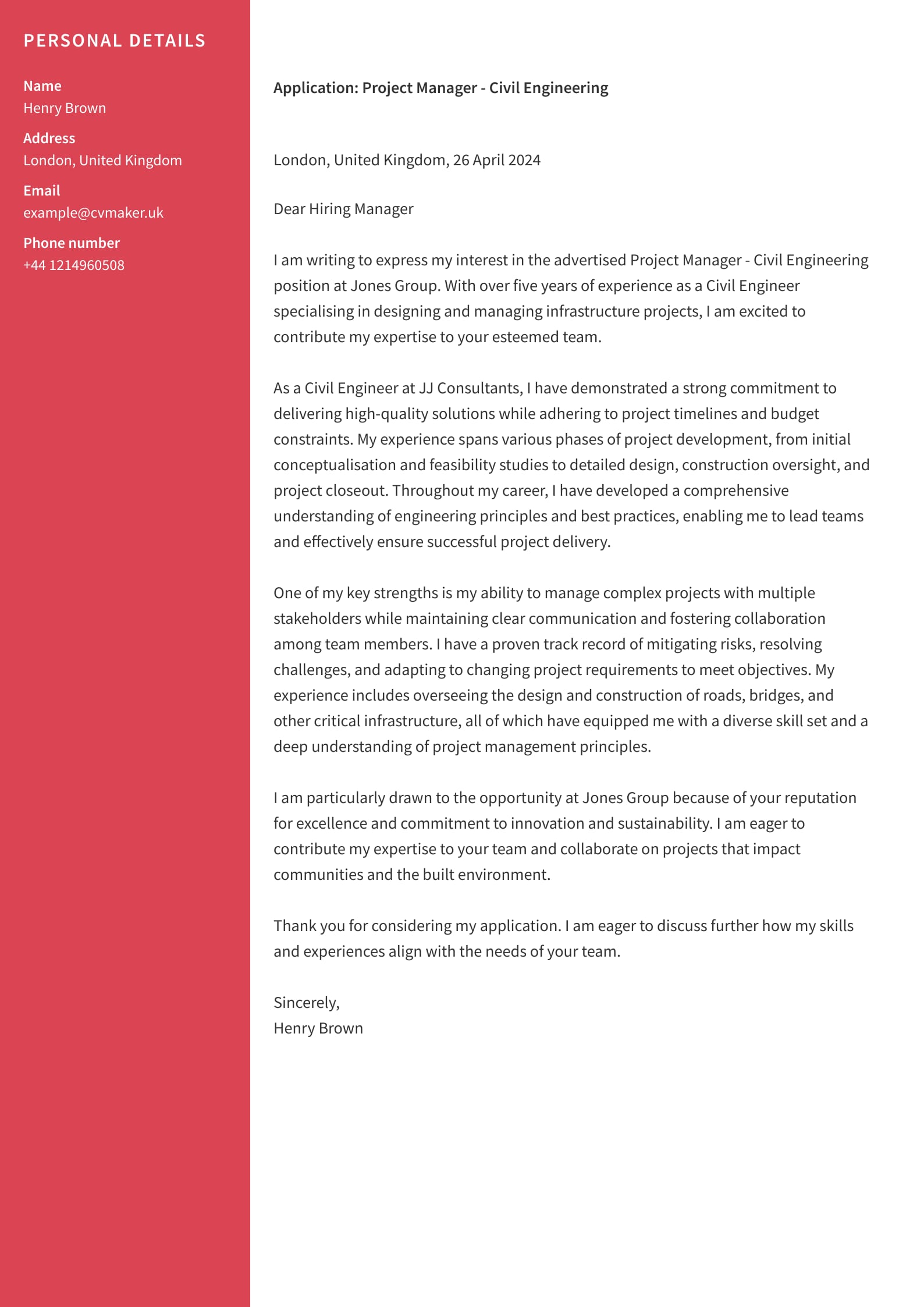Civil Engineer CV Example and Writing Guide
In this article:
How to write a civil engineering CV.
What sections to inlcude in a CV.
How to write a civil engineering CV if you have no experience.
Civil engineering CV examples.
A civil engineer stands at the forefront of shaping our societies. They play an essential role in designing, constructing, and maintaining the infrastructure that surrounds us, from towering skyscrapers to expansive road networks and sustainable water management systems. Their work ensures the functionality and safety of our built environment and contributes significantly to economic growth and environmental sustainability.
Within the engineering sector, the roles can vary, encompassing entry-level to senior positions, including but not limited to a range of specialised fields such as structural design, marine, environmental, construction, hydraulics, transportation, or geotechnical engineering. For more examples, refer to our engineering CV or engineering cover letter guides.
Civil Engineer CV example

Download this Civil Engineer CV sample in PDF
Henry Brown, a seasoned Civil Engineer, has opted for the Harvard CV template. With a deep understanding of core engineering principles, Henry's CV showcases his ability to provide expert guidance on complex civil engineering projects.

Refer to our modern CV or simple CV examples for more information on different formats.
What to include in a civil engineer CV?
A good CV highlights your qualifications and expertise pertinent to the desired role. Begin with your personal details and ensure that you include a concise, personal profile outlining your career goals and key strengths. Showcase your relevant education, including degrees, certifications, or licenses that align with the industry's demands.
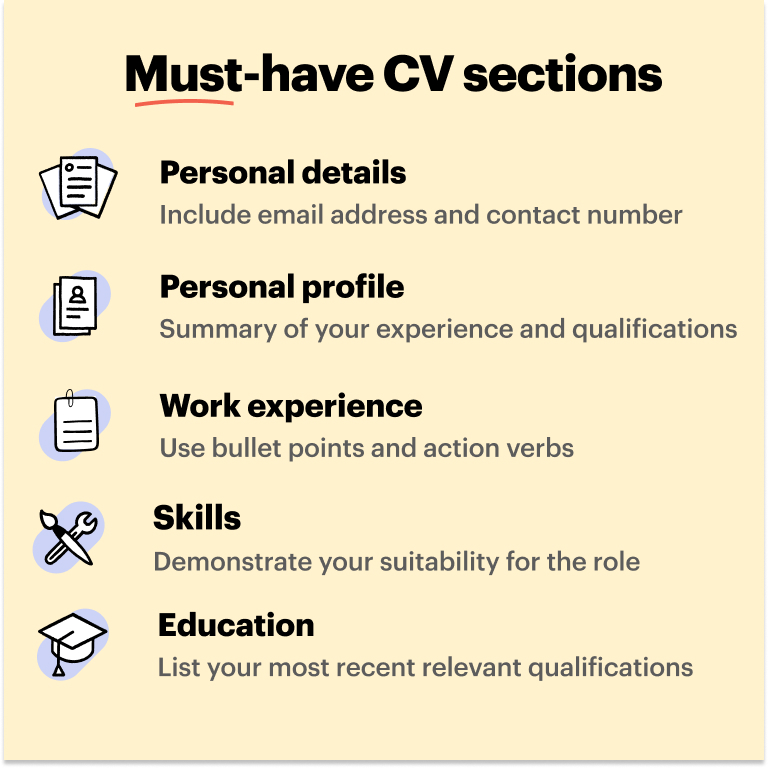
For more tips, refer to the following:
Include your full name, contact details (address, phone number, email), and LinkedIn.
A brief paragraph highlighting your experience, skills, and career goals.
List your educational qualifications, starting with the most recent degree.
Detail your work experience, starting with your current or most recent job.
Showcase your relevant technical skills such as AutoCAD or Revit.
List any relevant certifications, licenses, or professional affiliations you hold, such as being a licensed Professional Engineer (PE).
If applicable, highlight significant projects you have worked on, detailing your contributions and outcomes. Refer to our project manager CV for more tips.
Mention any accolades, awards, or recognition you have received.
If you are fluent in multiple languages, it can be beneficial to include this information.
If you're an academic, include relevant research papers or given presentations at conferences.
Include "References available upon request" or provide professional reference names and contact information if required.
How to write a good personal profile for a civil engineer
Writing a compelling personal profile, also known as a professional summary or personal statement, is essential for grabbing the attention of potential employers and showcasing your unique qualities.
Keep your personal profile brief and focused by writing between 4 and 6 sentences highlighting your key soft skills, qualifications, and career goals.
Adapt your profile for each job application by researching the specific requirements of the position you're applying to.
Highlight your areas of expertise, mentioning specialised skills or knowledge you possess that set you apart from other candidates.
Incorporate industry-related keywords and phrases that recruiters might be looking for.

Graduate civil engineer CV example
Enthusiastic and driven graduate civil engineer with strong academic foundation and keen desire to contribute to impactful infrastructure projects. Eager to apply theoretical knowledge gained from coursework to practical engineering challenges. Quick learner with excellent problem-solving skills, seeking opportunities to learn and grow within a dynamic engineering team.
Junior civil engineer CV example
Dedicated junior civil engineer with hands-on experience in construction project support and a demonstrated ability to collaborate within multidisciplinary teams. Proficient in utilising industry software and maintaining quality control standards. Committed to continuous skill development and embracing new challenges to contribute to the successful execution of complex engineering endeavours.
Senior civil engineer CV example
Seasoned senior civil engineer with extensive background in managing and overseeing large-scale infrastructure projects. Proven track record of delivering projects on time and within budget while maintaining the highest quality standards. Adept at leading cross-functional teams and harnessing innovative solutions to address complex engineering issues, demonstrating leadership in the field.
Pro Tip
Consider creating a section for career accomplishments or incorporate quantifiable achievements, such as the number of successful projects you've managed or their value into the work experience section.
Top skills to include on a civil engineering CV
Skills on a CV are essential because they provide potential employers with valuable insights into your capabilities and qualifications. They are a snapshot of your competencies and experiences, helping recruiters or hiring managers determine whether you possess the necessary skill set to excel in the position they seek to fill. Different types of skills serve distinct purposes and play various roles in showcasing your suitability for a job:

Hard skills are specific, measurable abilities that are typically acquired through formal education, training, or certification.
Construction Materials and Methods
Surveying and Site Layout
Project Management.
Soft skills are non-technical, interpersonal qualities that relate to how you interact with others and handle various situations in the workplace.
Problem-Solving
Written and Verbal Communication
Building Relationships with Clients and Stakeholders.
Transferable skills are abilities that can be applied across different roles and industries. They are versatile and not specific to a particular job. When listing transferable skills on your CV, try to provide examples of how you have applied them in past projects or experiences.
Adaptability
Flexibility
Attention to Detail.
Technical skills are a subset of hard skills and refer to specific abilities and knowledge related to a particular field or industry.
CAD Software: AutoCAD, Civil 3D, Revit, MicroStation.
Structural Analysis Software: STAAD.Pro, SAP2000, ETABS.
Find more specific skills in the mechanical engineer CV example writing guide.
Pro Tip
Create a separate section for technical skills where you list specific software or specialised design engineering tools.
For more tips, refer top skills employers are looking for.
How to civil engineering experience on a CV
When writing work experience, follow these tips to showcase your professional background and achievements effectively:
List your work experience in reverse chronological order, starting with your most recent or current position.
Highlight any notable achievements, successful projects, or contributions you made during your tenure.
Mention any specific technical skills or software you utilised in your work, especially if they are relevant to the job you're applying for.
If applicable, demonstrate your career growth and increasing responsibilities over time.
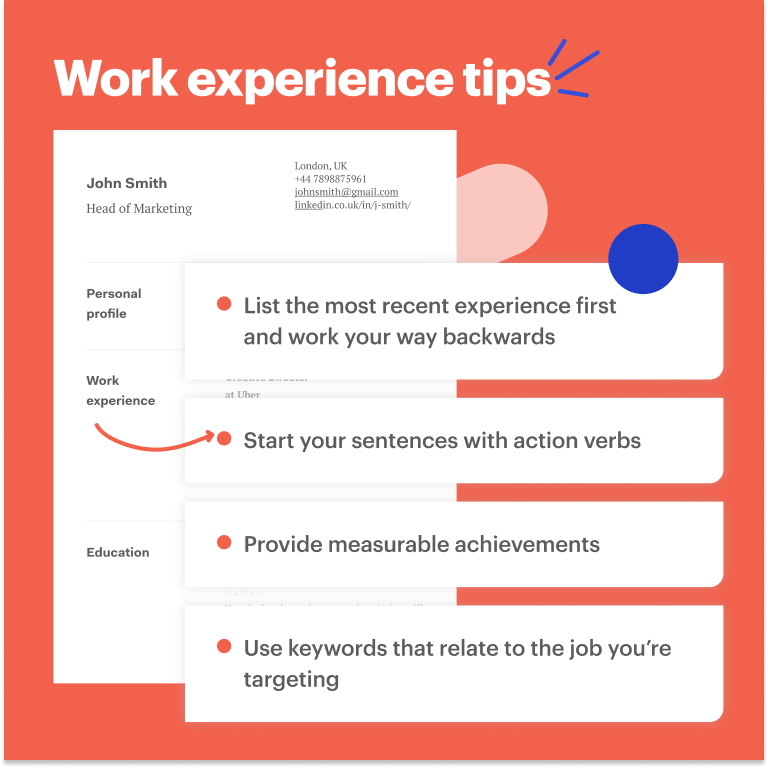
Civil Engineer, BC Consultants, London, UK | 2019 - Present
Led a team of structural engineers in designing and analysing the foundation and structural systems for a high-rise commercial building, ensuring compliance with local building codes and standards. Utilised AutoCAD and Revit to create detailed engineering drawings, facilitating effective communication with architects, contractors, and clients. Conducted site visits and inspections to verify construction progress and adherence to engineering specifications, resolving technical challenges as they arose.
Completed construction projects with budgets up to £10M, overseeing all stages from planning to execution and ensuring on-time delivery and quality workmanship.
Implemented sustainable design practices, resulting in 20% reduction in energy consumption in a LEED-certified project.
For more tips, refer to our construction CV example.
How to write a civil engineering CV with no experience
Whether you are a student or graduate seeking work experience, there are a few things to keep in mind. Firstly, follow a skills-based CV layout, and focusing on your education. Below is an example of soft skills to incorporate into your entry-level civil engineering CV.
Problem-solving
Attention to detail
Critical thinking
Project management
Teamwork.
These skills can be derived from university courses and should be backedup with examples within your CV. For more tips, refer how to write a CV with no experience.
How to add education to a civil engineer CV
When adding education, follow these steps to present your engineering qualifications effectively:
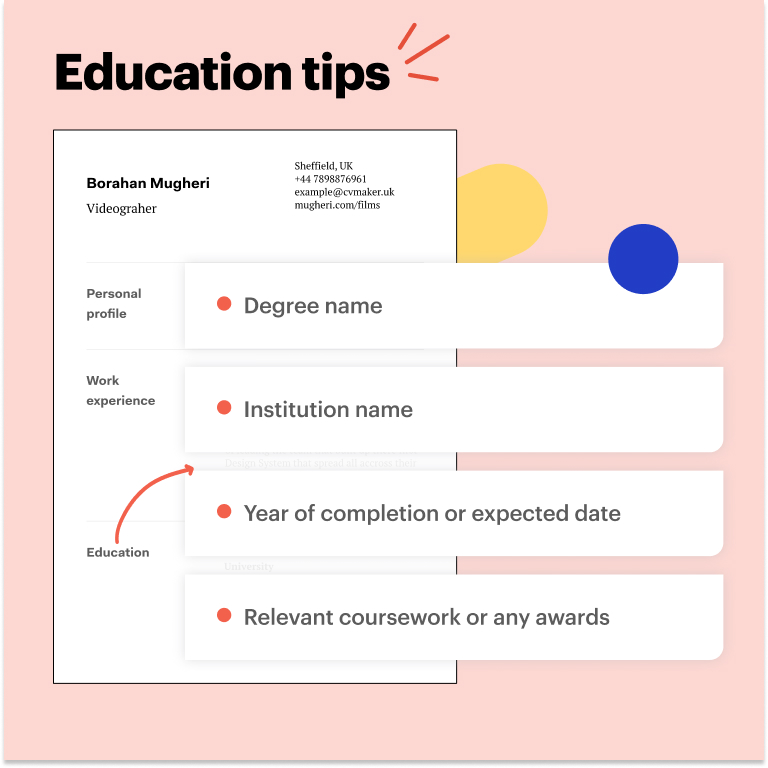
Include the following information:
Full name of the degree or qualification
Name of the educational institution where you studied
Location
Graduation year, expected graduation year, or in progress
Honours, awards, or distinctions received (if applicable).
Bachelor of Science in Civil Engineering (Hons), London University, UK | 2023
Relevant Courses: Structural Analysis, Geotechnical Engineering, Transportation Engineering, Environmental Engineering.
Pro Tip
Include only relevant educational qualifications. In most cases, this will be your highest completed degree in civil engineering. If you have multiple degrees, include the most recent and highest level of education first.
If you have completed any relevant courses or certifications, you can include them in a separate section or incorporate them into the education section.
Key takeaways
In conclusion, crafting the perfect CV for a civil engineering job is a strategic process that requires attention to detail and a tailored approach. Following a master CV and the tips in this article, you can increase your chances of landing more job interviews.
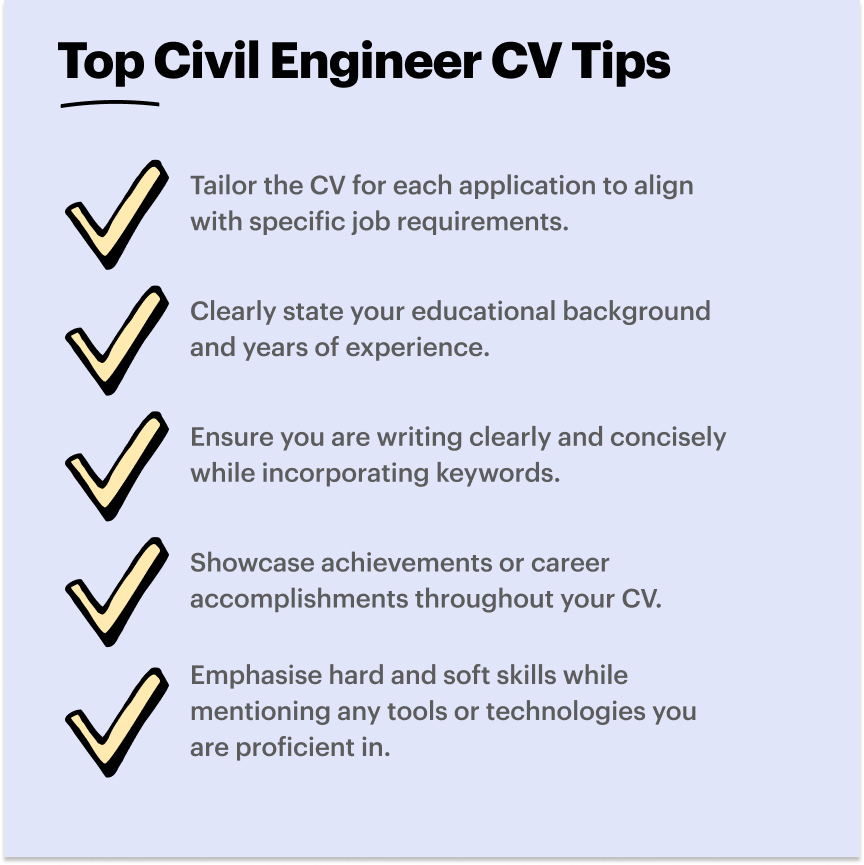
Next steps?
For aspiring civil engineers ready to advance their careers or improve their CVs, explore our extensive selection of CV examples that can be easily tailored to your career goals. Our CV Writing Service can also save you time and effort if you are writing a CV with no experience.
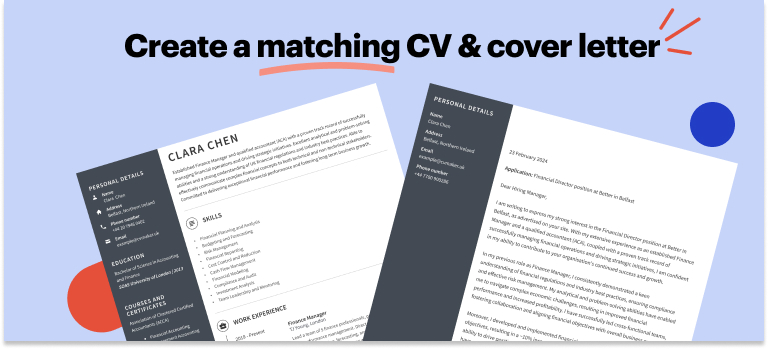
In addition, to enhance your job application further, we recommend familiarising yourself with how to start a cover letter to make the best impression on potential employers and land your dream role.
FAQ
How much do civil engineers make in the UK?
Civil engineering salary in the UK varies based on factors like experience, location, and company size. On average, entry-level civil engineers earn between £23,000 to £37,000 per year. With several years of experience, the salary can increase to around £44,000 to £67,000 annually. Senior civil engineers or those in managerial roles may earn £70,000 or more.
What makes a good civil engineer?
A good civil engineer should have excellent project management skills, effective leadership, technical competence, creativity, and communication. The most important skill they should have is the ability to problem-solve as the projects worked on can be complex, and they are involved in every stage.
How to become a professionally registered engineer?
According to Engineering Council, the requirements for Engineering Technician (EngTech), Incorporated Engineer (IEng), and Chartered Civil Engineer (CEng) can be found in the UK Standard for Professional Engineering Competence (UK-SPEC). Those for ICTTech are in the ICTTech Standard. To gain more insights into specific roles within the field, you can explore the diverse career opportunities in the UK through resources such as the prospects or the Institution of civil engineers (ICE).
What are civil engineering duties in a CV?
Typical duties include:
Designing and analysing structures, roads, bridges, and other infrastructure projects.
Conducting surveys and site investigations.
Preparing technical drawings and reports.
Collaborating with architects, contractors, and stakeholders.
Overseeing construction projects and ensuring compliance with regulations.
Evaluating environmental impact and implementing sustainable practices.
Managing project budgets and timelines.
Solving complex challenges and proposing innovative solutions.


